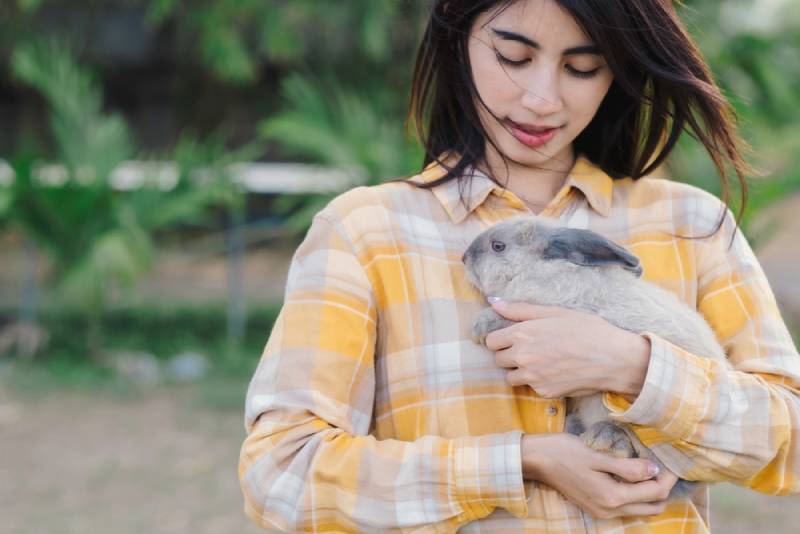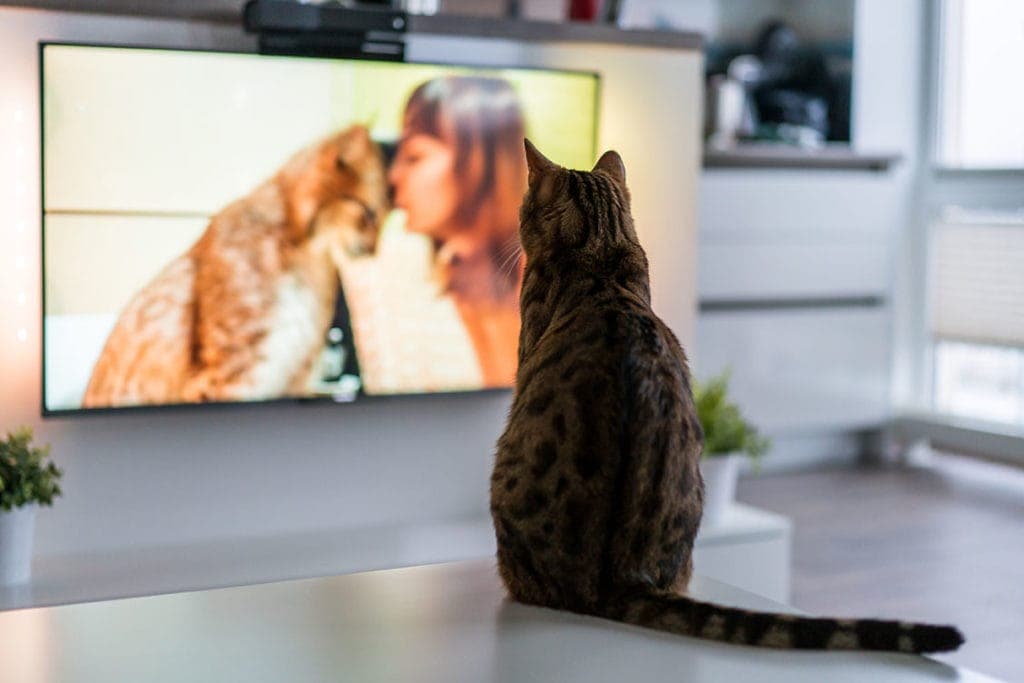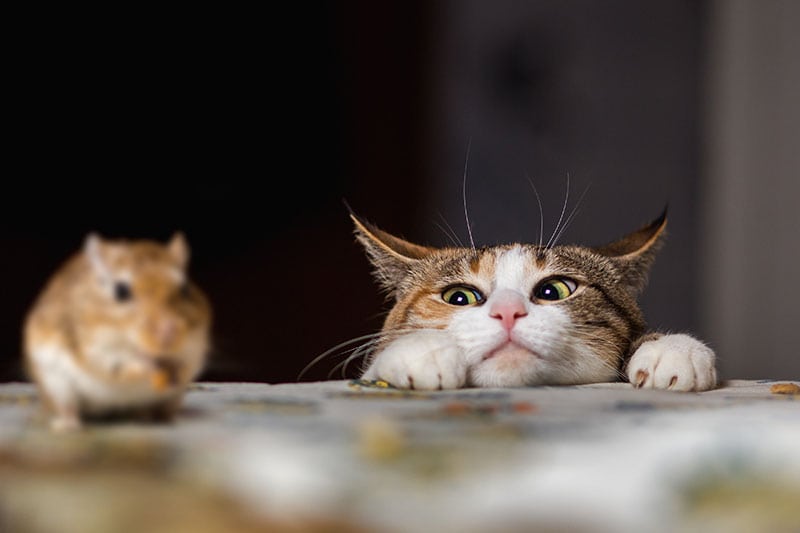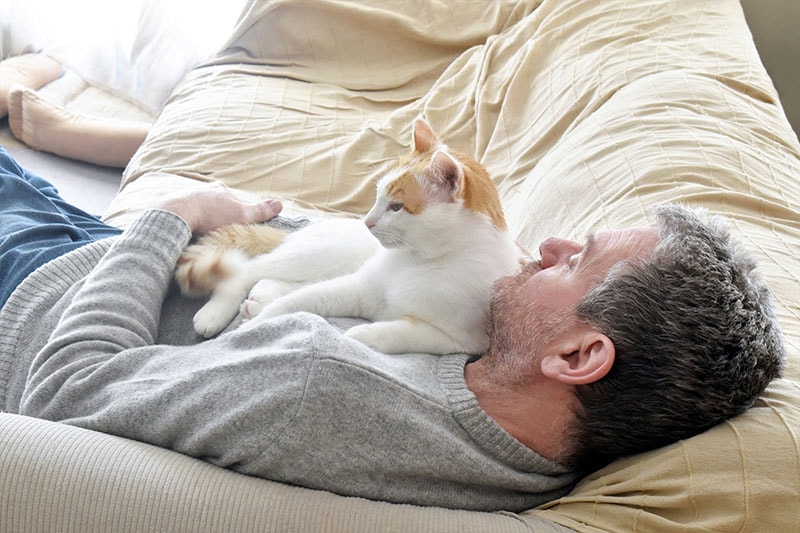VET APPROVED

The information is current and up-to-date in accordance with the latest veterinarian research.
Learn more »Click to Skip Ahead
When you have a pet, their happiness is critical to care. You’ll probably want to know that you’re doing your best to take care of them, ensuring they enjoy their lives.
So, if you want a rabbit, they differ greatly from having a dog or cat. How exactly do you know that your rabbit likes you? Here are some surefire ways to know that your rabbit enjoys your company.

The 7 Signs That Your Rabbit Likes You
1. Your Rabbit Is Calm in Your Presence
Rabbits are notoriously anxious creatures. That is because they are prey animals in the wild and must be on high alert to scope out potential dangers. If your rabbit is very calm when you approach them or when you’re around, this is an excellent indicator that they feel secure when they’re with you.
If a rabbit is able to feel secure in the presence of another being, chances are, they enjoy you very much. You could make them feel safer because they know you are larger and much more capable of handling things than they are. So they might see you as some refuge from danger as well.
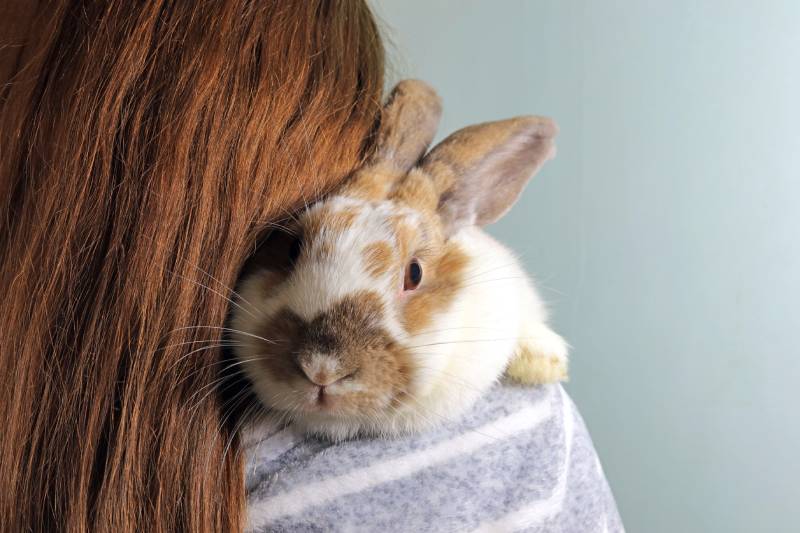
2. Your Rabbit Will Greet You
If your rabbit likes you, chances are, they will come right up to the enclosure every time you’re near to get a snack or some affection. Rabbits that willfully interact with their caretakers are generally very comfortable in the presence of whomever that might be.
Rabbits that are scared or wary of the person around them might hide in their hut or home in the enclosure. When they are out of the cage, they might duck for cover when they hear you coming near.
But if they don’t act phased by your presence, that is a terrific sign.
3. Your Rabbit Will Come to You During Floor Time
When your rabbit is out of their enclosure, they might want to play with you on their own accord. They could come up to you and run away, creating playful energy. They might want to hop around behind you or plop on your lap while sitting down.
If they choose to interact with you outside of the cage, you can see that they certainly enjoy your company. They would be ducking for cover underneath your bed or another safe space if they didn’t. You might also have trouble coaxing them out to put them back in their enclosure.
Often, if a rabbit really likes you, it will circle your feet, come close to you, and initiate play during floor time. If you’re experiencing any of those things, chances are, they like you quite a lot.
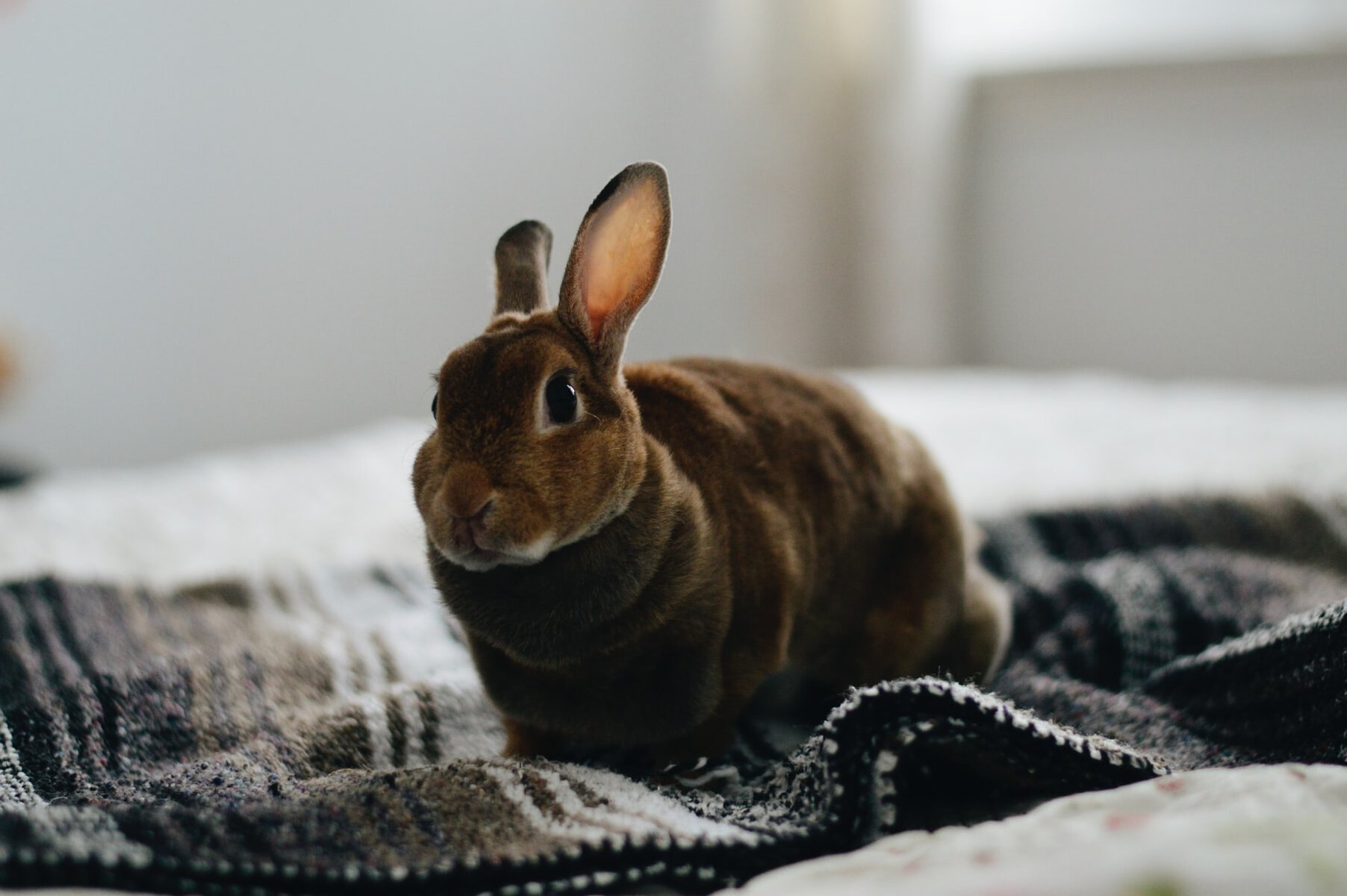
4. Your Rabbit Might Exhibit “Chinning”
You might be familiar with bunting concerning cats. This is when a cat will rub their head on your legs or other parts of your body. And while this might be mistaken as a sign of affection, it is actually a way to mark you as theirs.
Similarly, rabbits have scent glands underneath their chin. You might notice your rabbit rubbing their chin on their belongings and enclosures. This is a surefire way to claim these objects. If your rabbit exhibits this behavior with you, it can warm your heart to know that they’re claiming you as their very own. How adorable is that?
5. Your Rabbit Might Get the Binkies
What are binkies, you ask? A binky is when your rabbit literally jumps in the air to show excitement and happiness. If your rabbit is exhibiting this behavior around you, that means they are overjoyed with your presence.
They might be ready to play or have an adventure. But one thing is for certain – they are indescribably happy. This action is utterly adorable and potentially one of the biggest actions your rabbit can display.
So if your rabbit gets the binkies around you, consider yourself one lucky duck.

6. Your Rabbit Might Purr Like a Kitty
Does it sound absurd that a rabbit would purr? It isn’t! These critters certainly have the capability of making this vocalization. Have you ever heard it? You can listen to a first-hand account of a purring rabbit online!
Rabbits make this purring sound by lightly rubbing their teeth together. It creates a vibrational sound that shows their comfort and good mood.
When rabbits purr, they are not only happy with whatever is going on in their surroundings, but they are happy with your affection as well.
7. Your Rabbit Won’t Show Apprehensive Body Language
When a rabbit is unsure, uncomfortable, or frightened because of their environment, they will show certain signs.
- Flat ears
- Hunched position
- Freezing
- Bulging eyes
- Rapid breathing
- Jumpiness
- Aggression
On the other hand, if they are calm and cozy, they will display a different set of signs, including;
- Perky ears
- Relaxed posture
- Slow breathing
- Calm movement
If your rabbit seems to be happy as a clam around you, chances are, they like you just fine!
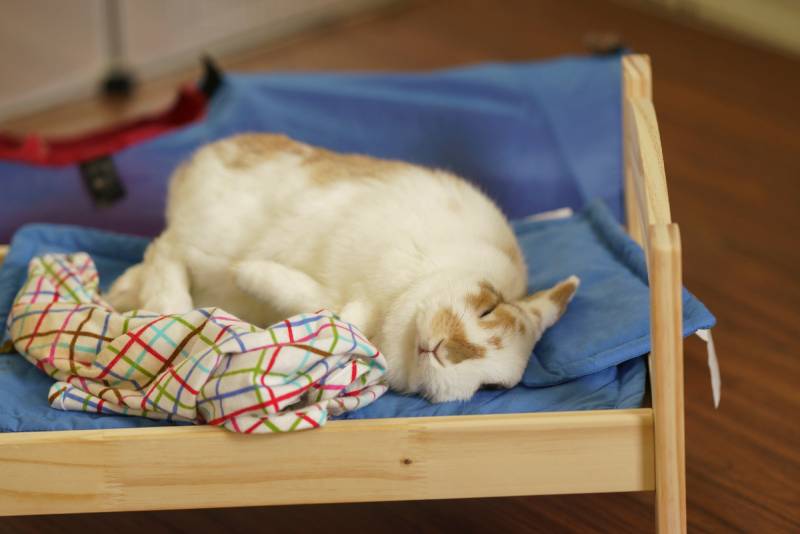

How to Warm Up a Skittish Rabbit
If you still have a skittish or uncertain rabbit, there are ways you can warm them up. Here are a few ideas to get your rabbit to come around.
Don’t Constantly Initiate Physical Contact
Interact with them without physically touching them. This will get them used to the calming tone of your voice, your smell, and your presence without feeling invaded. If you are handling them every time they interact with you, it could increase nervousness, and it might take them much longer to come around.
In fact, if you constantly handle them in a way that makes them feel threatened or unsteady, they might develop skittish and nervous tendencies, never coming around to human contact. Instead, let them know that you were there and that you are connecting with them without crossing the boundary of unwanted contact.
Use Positive Reinforcement
What rabbit can say no to a yummy snack? Get some healthy, rabbit-specific goodies, and let them come to you. This is very helpful when they are out of their enclosure. You can get them to approach you by offering an irresistible treat.
When they come to you, try to keep your hands off of them initially to create a sense of safety and peace. If they know they can eat uninterrupted, they will keep coming to you for snacks and build trust in that fashion.
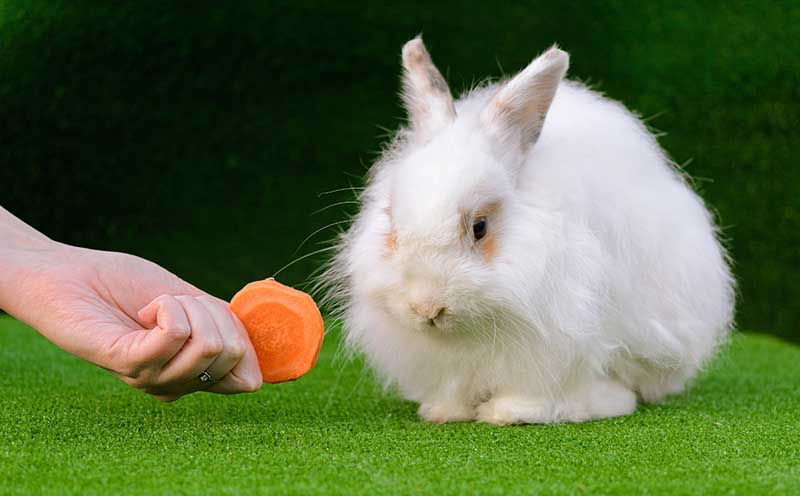
Hold Your Rabbit Correctly
If you have to pick your rabbit up, ensure you do so in a way that cradles their entire body and makes them feel unafraid. Often, it’s best to blind prey animals when they’re getting used to interacting.
Tuck their eyes underneath your arm, or cover them with a blanket to make them feel safer and more unseen. If you pick your rabbit up in the air, it can cause instant insecurity, which can lead to extreme fear and encourage nervousness.
Make Sure Your Rabbit’s Needs Are Met
Your rabbit relies on you for all of their primary care needs. They require proper bedding, shelter, and diet that only you can provide them. If you make sure all bases are covered, they will surely rely on you, building trust.
Once that routine and trust are established, your rabbit will depend on you and likely show you appreciation and affection through their actions.

Conclusion
There are plenty of ways to tell your rabbit loves you, but we can’t tell you any better than you can tell yourself. It’s a special bond that you feel with them. Some rabbits might take longer to warm up than others. They’re notoriously shy creatures.
However, with enough patience, understanding, and time, you and your rabbit can share a mutually beneficial relationship. Soon, you won’t have to wonder whether your bunny enjoys your company.
Featured Image Credit: Wanwajee Weeraphukdee, Shutterstock
